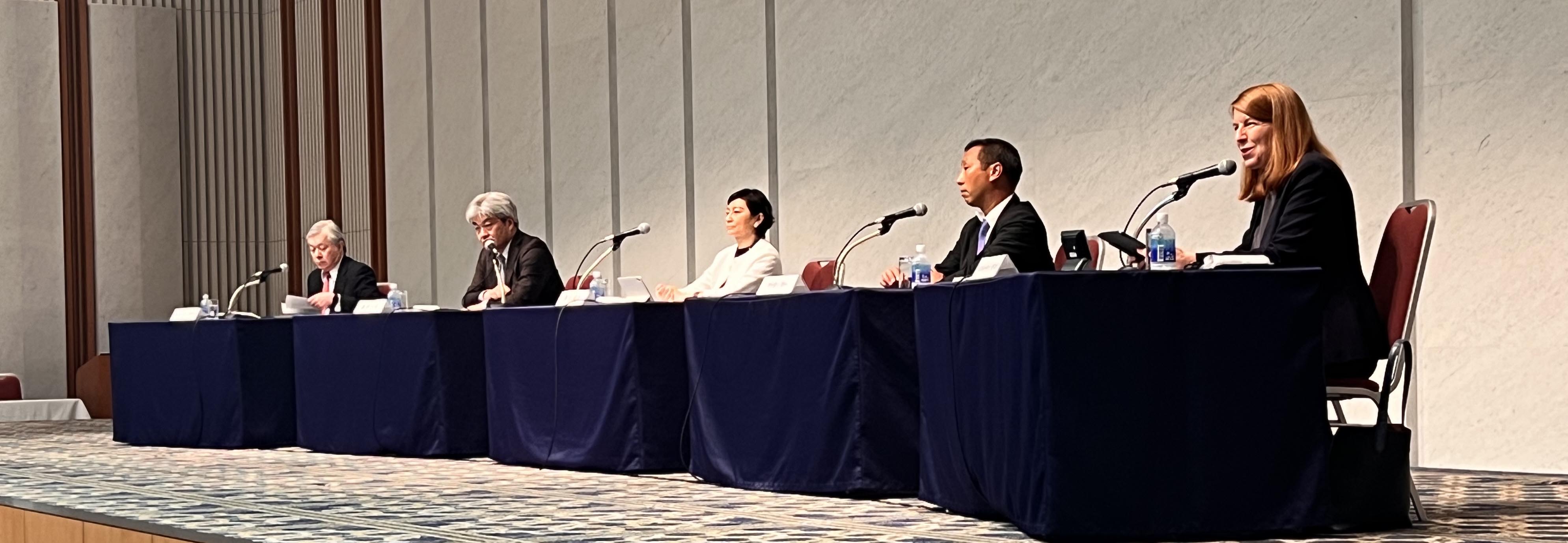
Symposium Geopolitical Risks and the Future of Capitalism: How Should Japanese Firms Respond?
July 06, 2023
Tokyo
KKC and Harvard University held a symposium titled “Geopolitical Risks and the Future of Capitalism: How Should Japanese Firms Respond?” Professor Christina Davis, Director of the Program on US-Japan Relations and Professor in the Government Department at Harvard University, stated in her opening remark that Japan currently faces one of the most challenging sets of geopolitical risks among advanced economies. The symposium’s first panel, titled “Navigating Geopolitical Risk,” addressed these geopolitical tensions amid economic interdependence.
Dr. Mark Wu, Henry L. Stimson Professor of Law at the Harvard Law School, stated that the focus of global businesses is currently undergoing a paradigm shift from operational efficiency to risk management. Furthermore, the trading system is moving from multilateralism to a clubs-based approach. He spoke about two key debates: Ex Ante vs. Ex Post risk management and how much to align with liberal vs. non-liberal groupings.
The second panelist was Dr. Rumi Aoyama, Professor at the Graduate School of Asia-Pacific Studies at Waseda University and Director of the Waseda Institute of Contemporary Chinese Studies, who talked about China’s policy of dealing with geopolitical risk. She stated that in China’s efforts to rebuild a resilient supply chain centered on itself, the countries of Central Asia, Southeast Asia, and the Global South are crucial.
Next, Dr. Kazuto Suzuki, Professor at the Graduate School of Public Policy at the University of Tokyo, addressed geopolitical risk from Japanese perspectives. He stated that there is currently a shift from free trade to the recognition that economic overdependence can be a vulnerability. In this regard, Japan established the Economic Security Promotion Act (ESPA) in May 2022 and promoted a concept of “strategic autonomy” — reducing dependence on particular countries and diversifying the supply chain — and “strategic indispensability” — improving the competitiveness to become indispensable in the global supply chain, thereby making it difficult for other countries to exercise economic coercion against Japan.
The last speaker of the first panel, Mr. Glen Fukushima, Vice Chair of the Securities Investor Protection Corporation (SIPC) and Senior Fellow at the Center for American Progress, addressed U.S. perspectives on geopolitical risk. He emphasized the importance of alliances and cooperation with like-minded countries, particularly the U.S.-Japan cooperation, amid the current uncertain and complex geopolitical environment.
After a short break, Professor Davis introduced the second panel, titled “The Future of Capitalism and Japanese Corporate Response,“ which looked at how to stimulate higher labor productivity and return on capital while responding to political demands for SDG and economic security.
Mr. Richard Dyck, Director and Investor of Japan Industrial Partners, spoke on U.S.-China tensions and Japanese firms. He talked about the success of the major restructuring and divestiture of a number of industrial giants.
Dr. Masako Egawa, Chancellor, School Judicial Person of Seikei Gakuen, spoke on recent developments in Japan’s corporate governance. She highlighted three major changes: Board independence, the unwinding of cross shareholdings and weakened role of main banks, and an increased focus on shareholder returns. Lastly, Ms. Egawa called upon Japanese companies to increase their ESG and diversity efforts.
The last panelist was Mr. Thierry Porté, Managing Director and Vice Chairman at J.C. Flowers & Co., who offered his perspective on financial aspects of geopolitical risk. He suggested two strategies for dealing with geopolitical risk: first, strengthening human resources by improving leaders’ skills and awareness as well as becoming more global and open, and second, strengthening the country through political discussion to find a consensus toward positive change.
A total of 185 people from businesses and academia attended the symposium.
